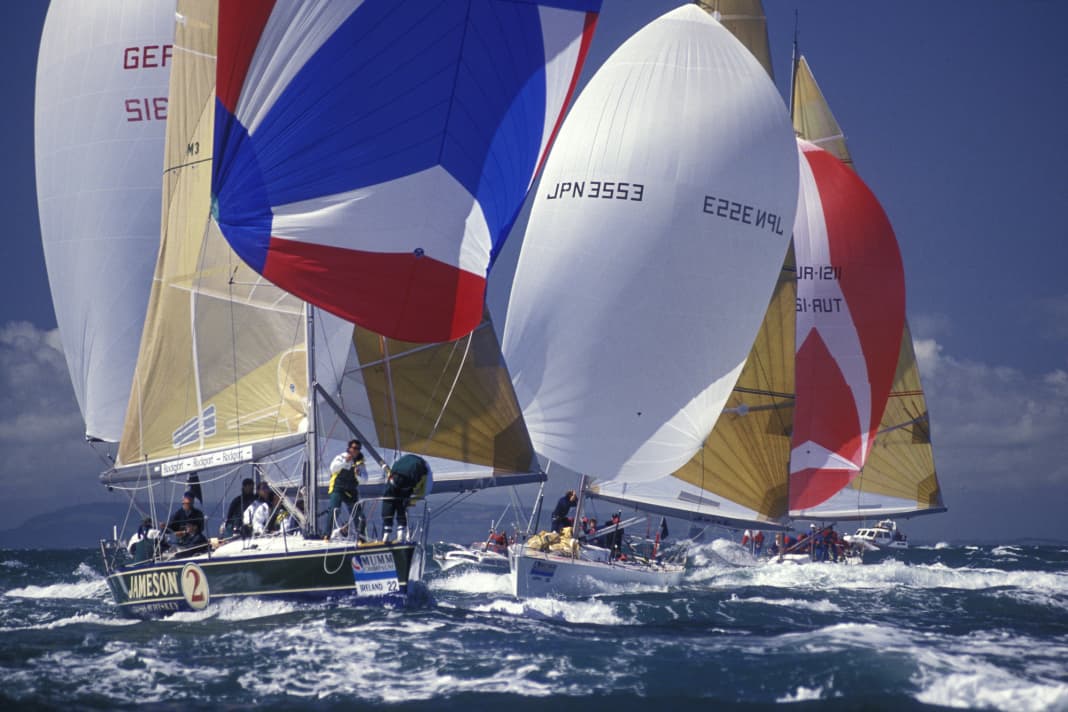





From 1957 to 2003, the Admiral's Cup was one of the most important ocean sailing competitions in international sailing. Including the Fastnet Race, the series was regarded as the unofficial world championship for national offshore sailing teams. Now the Admiral's Cup is to be held again in 2025 after a 22-year break and will then take place every two years as it once did. Due to its similar name, the competition has often been confused by laymen with the America's Cup, which also premiered off the Isle of Wight in 1851.
The German successes heralded Hans-Otto Schümann and the German team in 1973
As usual, the Admiral's Cup is hosted by the British and the Royal Ocean Racing Club. Teams from Great Britain have won the ornate golden trophy nine times. Germany, as the second-best national team, has won four times, the USA and Australia three times each, with Australia being the current "long-term defender" of the legendary trophy.
Hans-Otto Schümann ("Rubin"), also known as the "father of German sailing", Albert Büll ("Saudade") and Dieter Monheim ("Carina III") had also made the Admiral's Cup famous in Germany with their first victory in 1973. France, Italy, the Netherlands and New Zealand also celebrated victories in the glittering history of the Cup. After 1973, Germany's offshore aces went on to win in 1983, 1985 and 1993.
The Admiral's Cup revival comes to the 100th anniversary of the RORC
"The reintroduction of the Admiral's Cup is a wonderful way to celebrate the centenary of the Royal Ocean Racing Club," says RORC Commodore James Neville. "The chosen format for the Admiral's Cup 2025 respects the tradition of the regatta and chooses IRC classes for boats sailing at the highest level internationally. By announcing more than two years before the start of the Admiral's Cup, teams will have time to prepare for a fantastic event. The aim of the RORC is to attract teams from all over the world to the Admiral's Cup 2025."
The Admiral's Cup 2025 is organised by the renowned Royal Ocean Racing Club (RORC) in Cowes on the Isle of Wight. As in the golden age, the races will consist of a combination of inshore and longer races. Unlike in the past, the teams will consist of just two boats each, representing a yacht club or a country.
As many boat types as possible should be able to participate
Commenting on the types of boats that could suit the revitalised Admiral's Cup, RORC Rating Office Director Jason Smithwick said: "IRC produces the most exciting and capable boats in the world and the Admiral's Cup is a great opportunity to showcase our fleet."
Smithwick continued: "The IRC rating band and the lengths of the Admiral's Cup classes have been carefully defined to allow as many boat types as possible to participate." At the same time, the aim is to create classes in each class that are as compact as possible for the regatta in the Solent and neighbouring waters. The classification groups have been deliberately chosen so that the boats compete against each other in similar conditions in the numerous Admiral's Cup races."
Two classes, one team
Specifically, the two boat classes will look like this: In Admiral's Cup Class 1, the larger boats with a length of over 44 feet (13.41 metres) up to 56 feet (17.20 metres) will start. These include boats such as the Cookson 50 and the highly competitive TP52/IRC-52 fleet. The smaller boats in Admiral's Cup Class 2 range in length from 36 feet (11 metres) to 44 feet (13.40 metres). Many boat options with comparatively high performance fit here, for example the MAT 1180, the J/125, the GP42 or the Ker 46.
"The RORC Race Team is delighted with the organisation of the Admiral's Cup. We look forward to welcoming the participating teams to the Solent and Cowes," said RORC Racing Manager Steve Cole. The new Admiral's Cup will be served up in a mix of close coastal racing and middle distance races, culminating in the legendary classic: the Rolex Fastnet Race.
Invited are national and club teams
The Royal Ocean Racing Club wants to write to all major yacht clubs around the world and invite them to enter a team for the revived classic. An initial list of interested teams is to be published on 19 July 2023, exactly two years to the day before the first starting shot.
Scenes from the 7th Admiral's Cup and the Fastnet Race 1969:
Aged but authentic Admiral's Cup coverage from 1983. 40 years ago, Radio Bremen's sports reporter legend Jörg Wontorra also spoke with the then "Sabina" sailors and Admiral's Cup winners Thomas "Beppo" Michaelsen and Tim Kröger:

Tatjana Pokorny
Sports reporter

